#python programming books for beginners
Explore tagged Tumblr posts
Text
Proqramçı olmaq istəyirəm
Proqramçı olmaq istəyənlər üçün yol xəritəsini təqdim edirəm.
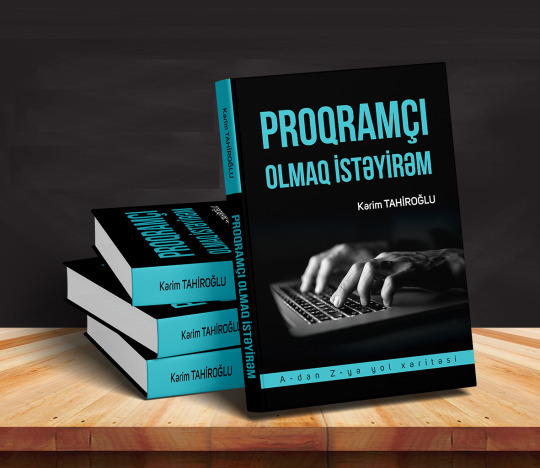
“Hər kəs proqramlaşdırmanı öyrənməlidir, çünki o sizə düşünməyi öyrədir”.
Stiv Cobs
Bu gün ən prestijli və ən çox qazandıran ixtisaslardan biri, bəlkə də, bi- rincisi proqramlaşdırmadır. Bu faktdan xəbərdar olan bir çox insanlar həvəsə gəlib proqramçı olmaq istəyirlər. Əlbəttə ki, hər bir işə başlamaq üçün həvəs yaxşı motivatordur, lakin uğur qazanmaq və müvəffəq olmaq üçün kifayət deyil.
Biz məsələyə daha konseptual yanaşacaq və proqramçı olmaq istəyənlərə dəyərli tövsiyələr verəcəyik.
Nə və niyə?
Proqramçı olmaq arzusuna düşənlərin ilk işi bu iki suala cavab tapmaq olmalıdır: nə və niyə? Proqramlaşdırma nədir və mən niyə proqramçı ol- maq istəyirəm? Sözsüz ki, hər bir insan seçəcəyi ixtisasın mahiyyətini dərk etməlidir. Proqramlaşdırma nədir, onun özünəməxsusluğu nədən ibarətdir, hansı çətinlikləri vardır? Bu suallara cavab tapmaq üçün əvvəlcə özünüz araşdırmalı və daha sonra peşəkar proqramçılarla görüşməlisiniz. Yalnız bundan sonra özünüzə “mən niyə proqramçı olmaq istəyirəm” sualını verə bilərsiniz. Bax bu zaman vicdanınız qarşısında tam səmimi olmalısınız. Əgər cavabınız çoxlu pul qazanmaqdırsa, siz ən yaxşısı tacir olmağı seçin. Çünki proqramlaşdırma bir həyat tərzidir, fərqli bir dünyadır. Ona aşiq olmadan bu yolun yolçusu olunmaz. Əgər cavabınız “proqramlaşdırma mənim düşüncə və həyat tərzimə uyğundur, mən özümü onda görürəm” olsa, bax bu başqa məsələ. Deməli, Siz proqramçı olmaq üçün doğulmusunuz…
Doğru yol və sağlam cığır
Bəs proqramçı olmaq üçün nə etmək lazımdır? Uzaq və yaxın məqsəd nədir? Nədən və necə başlamalı? Hansı proqramlaşdırma dilini öyrənməli, hansı kitabları oxumalı, hansı kurslara getməli? Növbəti mərhələdə bu suallara cavab tapmalısınız.
Proqramçı olmağa qərar verəndən sonra sizə bir neçə yol görünəcək. Siz doğru yolu seçməlisiniz. Məqsədə çatmaq üçün bir çox yollar var, amma bu şəxsdən şəxsə dəyişir. Hansı yolun Sizin üçün doğru olduğuna yalnız özünüz qərar verə bilərsiniz. Bunun üçün hansı sahə üzrə proq- ramlaşdırma ilə məşğul olacağınızı müəyyənləşdirin. Sahələr müxtəlifdir: tətbiqi, sistem, mobil, veb, oyun və s. Seçəcəyiniz sahə sizin yolunuzu müəyyənləşdirəcək, bu da öz növbəsində uzaq məqsədinizin nə olduğunu aydınlaşdıracaq.
Doğru yolu təsbit etdikdən sonra sizi o yola götürən sağlam bir cığırı tapmaq lazımdır. Başqa sözlə desək, yaxın məqsədləri müəyyən et- məlisiniz. Yaxın məqsədlər isə alqoritm anlayışı və proqramlaşdırmanın əsaslarına sahib olmaqdır. Bunun üçün ən asan proqramlaşdırma dilindən başlamaq məsləhətdir. Bu, Python ola bilər.
Kitab seçimi
Kitab seçimi çox önəmlidir. Elə bir kitab seçməlisiniz ki, Sizi yarıyolda qoymasın. Mütləq özü öyrənənlər və yeni başlayanlar üçün nəzərdə tutulan kitablardan istifadə etməlisiniz. İlk proqramlaşdırma kitabınızın dili çox sadə, həmçinin əyləncəli olmalıdır.
Özüm öyrənim, yoxsa kursa gedim?
Asan olmasa da, özünüzün öyrənməyiniz mümkündür. Bunun üçün iradə, nizam-intizam və səbir lazımdır. Əlbəttə, kursa getməklə təkbaşına öyrəndiklərinizi daha qısa zamanda öyrənə bilərsiniz. Kursa getməyə imkanınız yoxdursa, yenə də üzülməyin. Çox yaxşı onlayn kurslar da mövcuddur, həm də pulsuz.
Təcrübə, təcrübə, təcrübə
Proqramlaşdırmanı yaxşı öyrənmək üçün bu işin nəzəriyyəsini, fun- damental əsaslarını və konsepsiyasını çox yaxşı bilməlisiniz. Proqramlaş- dırmanı yaxşı bacarmaq üçün isə bol-bol praktika lazımdır. Necə ki, yaxşı piano çalmaq üçün çox piano çalmaq lazımdır. Eləcə də yaxşı proqram yazmaq üçün çoxlu proqram yazmaq lazımdır. Uzun sözün qısası, daima alqoritm tərtib etmək bacarığınızı təkmilləşdirməli və proqramlaşdırma məntiqinizi inkişaf etdirməlisiniz. Bunun üçün müxtəlif çətinlik dərəcəli məsələləri həll edin, fərqli və optimal həll yollarını axtarın, eksperimentlər aparmaqdan çəkinməyin. Əlavə olaraq müxtəlif proqramlaşdırma yarışla- rında iştirak edin. Bütün bunlar həm təcrübənizi, həm də özünüzə inamınızı artıracaq.
Əlavə resurslar
Bir tərəfdən proqramlaşdırın, digər tərəfdən də öyrənməyə davam edin. Forumlara üzv olun, bloqları izləyin, videodərslərə baxın. Bir sözlə, daim araşdırın və əlavə resurslardan hər zaman istifadə edin. Bu şəkildə biliklərinizi daha da zənginləşdirmiş olacaqsınız.
Bir mürşidiniz olsun
Tanıdığınız (real və ya virtual) ən azı bir peşəkar proqramçı olsun. Rahat sual verə bildiyiniz, məsləhət aldığınız, sizə yol göstərən bir proqramçı. Amma siz onu primitiv suallarınızla bezdirməyin. Əvvəlcə özünüz araşdırın, sualınıza cavab tapa bilməsəniz, bir də araşdırın. Araşdırmanız nəticəsiz qalsa, bir daha sınayın. Yalnız 3-cü uğursuz cəhddən sonra mür-şidinizdən soruşun.
Bildiklərinizi paylaşın
Bilik paylaşdıqca artır. Bu qızıl qaydanı unutmayın. Siz də bildiklərinizi bu yolun yolçuları ilə bölüşün. İnanın, bunun sizə də faydası olacaq. Bilik- ləriniz həm yenilənəcək, həm də canlı qalacaq.
Günün nəbzini tutun
Proqramlaşdırma ilə bağlı hər şeyi izləyin, dəyişiklik və yeniliklərdən xəbərdar olun. Unutmayın ki, proqramlaşdırma dilləri də gün keçdikcə inkişaf edir, daha da zənginləşir.
Layihələr
Nəzəri biliklər və müəyyən dərəcədə praktiki vərdişlər əldə etdikdən sonra layihələrə başlaya bilərsiniz. İlkin olaraq kiçik layihələrdən başlamağınız məsləhətdir. Unutmayın, məsələ layihənin kiçikliyində və ya böyüklüyündə deyil. Əsas odur ki, başladığınız işi yarımçıq qoymayasınız. Hətta ən kiçik layihəni belə inkişaf etdirərək kifayət qədər ciddi proqram məhsulu halına gətirmək mümkündür. Burada əsas məsələ prosesin özüdür. Layihə boyunca qarşılaşdığınız problemləri anlamaq, onların həll yollarını tapmaq, bu həllərdən optimal olanını seçmək, addım-addım layihənin qarşınızda şəkillənməsi, onun təkmilləşdirilməsi… Bütün bunlar sizə tərifolun- maz həyəcan verəcək, zövq yaşadacaq.
Startaplar
Artıq bir neçə müstəqil layihəniz olduqdan sonra startap komandalarına da qoşula bilərsiniz. Bu sizə həm təcrübə qazandıracaq, həm komanda ruhu aşılayacaq, həm də əgər bəxtiniz gətirsə, pul qazandıracaq.
Təcrübə proqramları
Müəyyən səviyyəyə gəldikdən sonra hökmən şirkətlərin elan etdiyi pullu və ya pulsuz təcrübə proqramlarına qoşulun. Gələcək karyeranız adına bu çox uğurlu bir başlanğıc ola bilər. Bu zaman həm real təcrübə qazanar, həm də CV-nizə fəxrlə bir referans əlavə etmiş olarsınız. Hətta bəxtiniz gətirsə, təcrübə keçdiyiniz şirkət sizə real iş təklifi də edə bilər.
Sertifikatlar
Əsas bilik və bacarıqlardır, sertifikat o qədər də vacib deyil. Bu fikir, əsasən, doğrudur. Amma bilik və bacarıqlara yiyələndikdən sonra sertifikatlar əldə etmək sizin peşəkarlığınızın real göstəricisi ola bilər. Şirkətlərə iş müraciətlərində, eləcə də müqavilə şərtlərində bu sertifikatların təsiri çox böyükdür. Digər tərəfdən sertifikat imtahanlarına hazırlaşarkən bilik- lərinizi sistemləşdirmiş olacaqsınız.
İşə düzəlmə
Proqramlaşdırma peşəkar fəaliyyətdir. Proqramçı olmaq arzusu ilə çıxdığınız bu yolun bir mənzili, məntiqi nəticəsi olmalıdır. Bu da, təbii ki, işə düzəlməkdir. Uğurlu karyera qurmaq üçün bura qədər verdiyimiz məsləhətlərə hərfiyyən əməl etməlisiniz. Yalnız bu zaman iş müsahibələrində özünəinamınız güclü olacaq. İmkanlarınızı layiqincə qiymətləndirin və iş təkliflərinə praqmatik yanaşın. Sizə uğurlar!
“Proqramçı olmaq istəyirəm” kitabı səh. 14–18 (Kərim Tahiroğlu)
#programming#coding#beginner#programming languages#software development#python#azerbaycan#programming book
1 note
·
View note
Note
hi!! do you have any free resources or textbooks for learning python? i’m doing my dissertation and i need a refresher before i start doing it properly. thanks!!
Hiya! 💗
Here you go:
Book
Python Objects and Classes
Roadmap.sh
Random Python Resources
Top 20 Python Projects for Beginners to Master the Language
Free Programming Books
Python Notes and Resources by @trialn1error
Python Official Roadmap
Python Project List
Python 3 Cheat Sheet
Python Cheatsheet for Beginners
These are the ones' I've shared on my blog over the years! Hope their helpful! 🥰👍🏾💗
#my asks#resources#python resources#codeblr#coding#progblr#programming#studying#studyblr#learn to code#comp sci#tech#programmer
346 notes
·
View notes
Text
Why Not Write Cryptography
I learned Python in high school in 2003. This was unusual at the time. We were part of a pilot project, testing new teaching materials. The official syllabus still expected us to use PASCAL. In order to satisfy the requirements, we had to learn PASCAL too, after Python. I don't know if PASCAL is still standard.
Some of the early Python programming lessons focused on cryptography. We didn't really learn anything about cryptography itself then, it was all just toy problems to demonstrate basic programming concepts like loops and recursion. Beginners can easily implement some old, outdated ciphers like Caesar, Vigenère, arbitrary 26-letter substitutions, transpositions, and so on.
The Vigenère cipher will be important. It goes like this: First, in order to work with letters, we assign numbers from 0 to 25 to the 26 letters of the alphabet, so A is 0, B is 1, C is 2 and so on. In the programs we wrote, we had to strip out all punctuation and spaces, write everything in uppercase and use the standard transliteration rules for Ä, Ö, Ü, and ß. That's just the encoding part. Now comes the encryption part. For every letter in the plain text, we add the next letter from the key, modulo 26, round robin style. The key is repeated after we get tot he end. Encrypting "HELLOWORLD" with the key "ABC" yields ["H"+"A", "E"+"B", "L"+"C", "L"+"A", "O"+"B", "W"+"C", "O"+"A", "R"+"B", "L"+"C", "D"+"A"], or "HFNLPYOLND". If this short example didn't click for you, you can look it up on Wikipedia and blame me for explaining it badly.
Then our teacher left in the middle of the school year, and a different one took over. He was unfamiliar with encryption algorithms. He took us through some of the exercises about breaking the Caesar cipher with statistics. Then he proclaimed, based on some back-of-the-envelope calculations, that a Vigenère cipher with a long enough key, with the length unknown to the attacker, is "basically uncrackable". You can't brute-force a 20-letter key, and there are no significant statistical patterns.
I told him this wasn't true. If you re-use a Vigenère key, it's like re-using a one time pad key. At the time I just had read the first chapters of Bruce Schneier's "Applied Cryptography", and some pop history books about cold war spy stuff. I knew about the problem with re-using a one-time pad. A one time pad is the same as if your Vigenère key is as long as the message, so there is no way to make any inferences from one letter of the encrypted message to another letter of the plain text. This is mathematically proven to be completely uncrackable, as long as you use the key only one time, hence the name. Re-use of one-time pads actually happened during the cold war. Spy agencies communicated through number stations and one-time pads, but at some point, the Soviets either killed some of their cryptographers in a purge, or they messed up their book-keeping, and they re-used some of their keys. The Americans could decrypt the messages.
Here is how: If you have message $A$ and message $B$, and you re-use the key $K$, then an attacker can take the encrypted messages $A+K$ and $B+K$, and subtract them. That creates $(A+K) - (B+K) = A - B + K - K = A - B$. If you re-use a one-time pad, the attacker can just filter the key out and calculate the difference between two plaintexts.
My teacher didn't know that. He had done a quick back-of-the-envelope calculation about the time it would take to brute-force a 20 letter key, and the likelihood of accidentally arriving at something that would resemble the distribution of letters in the German language. In his mind, a 20 letter key or longer was impossible to crack. At the time, I wouldn't have known how to calculate that probability.
When I challenged his assertion that it would be "uncrackable", he created two messages that were written in German, and pasted them into the program we had been using in class, with a randomly generated key of undisclosed length. He gave me the encrypted output.
Instead of brute-forcing keys, I decided to apply what I knew about re-using one time pads. I wrote a program that takes some of the most common German words, and added them to sections of $(A-B)$. If a word was equal to a section of $B$, then this would generate a section of $A$. Then I used a large spellchecking dictionary to see if the section of $A$ generated by guessing a section of $B$ contained any valid German words. If yes, it would print the guessed word in $B$, the section of $A$, and the corresponding section of the key. There was only a little bit of key material that was common to multiple results, but that was enough to establish how long they key was. From there, I modified my program so that I could interactively try to guess words and it would decrypt the rest of the text based on my guess. The messages were two articles from the local newspaper.
When I showed the decrypted messages to my teacher the next week, got annoyed, and accused me of cheating. Had I installed a keylogger on his machine? Had I rigged his encryption program to leak key material? Had I exploited the old Python random number generator that isn't really random enough for cryptography (but good enough for games and simulations)?
Then I explained my approach. My teacher insisted that this solution didn't count, because it relied on guessing words. It would never have worked on random numeric data. I was just lucky that the messages were written in a language I speak. I could have cheated by using a search engine to find the newspaper articles on the web.
Now the lesson you should take away from this is not that I am smart and teachers are sore losers.
Lesson one: Everybody can build an encryption scheme or security system that he himself can't defeat. That doesn't mean others can't defeat it. You can also create an secret alphabet to protect your teenage diary from your kid sister. It's not practical to use that as an encryption scheme for banking. Something that works for your diary will in all likelihood be inappropriate for online banking, never mind state secrets. You never know if a teenage diary won't be stolen by a determined thief who thinks it holds the secret to a Bitcoin wallet passphrase, or if someone is re-using his banking password in your online game.
Lesson two: When you build a security system, you often accidentally design around an "intended attack". If you build a lock to be especially pick-proof, a burglar can still kick in the door, or break a window. Or maybe a new variation of the old "slide a piece of paper under the door and push the key through" trick works. Non-security experts are especially susceptible to this. Experts in one domain are often blind to attacks/exploits that make use of a different domain. It's like the physicist who saw a magic show and thought it must be powerful magnets at work, when it was actually invisible ropes.
Lesson three: Sometimes a real world problem is a great toy problem, but the easy and didactic toy solution is a really bad real world solution. Encryption was a fun way to teach programming, not a good way to teach encryption. There are many problems like that, like 3D rendering, Chess AI, and neural networks, where the real-world solution is not just more sophisticated than the toy solution, but a completely different architecture with completely different data structures. My own interactive codebreaking program did not work like modern approaches works either.
Lesson four: Don't roll your own cryptography. Don't even implement a known encryption algorithm. Use a cryptography library. Chances are you are not Bruce Schneier or Dan J Bernstein. It's harder than you thought. Unless you are doing a toy programming project to teach programming, it's not a good idea. If you don't take this advice to heart, a teenager with something to prove, somebody much less knowledgeable but with more time on his hands, might cause you trouble.
358 notes
·
View notes
Text
"Python Course for Beginners" with Estefanía ...
youtube
Post #102: YouTube, Estefanía Cassingena-Navone, Learn Python In 2 Hours, 2023.
Estefanía is one of my favourite programming instructors. She explains step by step and visualizes wonderfully. I also like her voice and how she gets to the heart of the learning content. I have booked several coding courses on Udemy which are really excellent.
#i love coding#programming#coding#learning#education#i love programming#coding is fun#programming language#i love python#coding for kids#Youtube
50 notes
·
View notes
Text
Trying to learn Python programming for the third time.
I started with a beginner course on Udemy. Previously, I attempted to learn Python twice using books and online resources, but I gave up because I lost interest. This time, I’m determined to complete the course and become a Python programmer, at least at a beginner level.
9 notes
·
View notes
Text



tune into megumi.fm ?
💗 about me
name: meg/megumi age: 20+ pronouns: he/she/they currently: MSc Biotechnology languages: english, hindi, korean (beginner)
🌙 interests
subjects (academic): structural biology, network theory, programming (mainly python, a little bit of R), organic chemistry, genomics subjects (non-academic): mythology, etymology, literature, film studies and screenplay, animation hobbies: reading, singing, dancing, listening to music, watching video essays on youtube other interests: kdramas, jdramas, anime, kpop, indian classical music, indie games
📚 academic goals
short term - getting through my masters degree long term - getting a PhD (hopefully)
🦋 personal goals
- tracking my finances and learning to spend less - learning to cook healthy food that I personally enjoy eating - movement! learning lots of kpop dances - reading lots of books, and exploring new genres - developing a mini game
📍 navigation:
- Academic progress trackers (+liveblogging) - Internship progress trackers - Misc to-dos - Resources - Adventures in journalling - Interactions with besties archived - 2024 weekly tracker - Tatami Galaxy Challenge - Apr'24 Habit Tracker - 2023 daily tracker
#abt me <3#get to know me#digital journaling#introductory post#studyblr#study blog#bookblr#codeblr#desi studyblr#desi academia#stemblr#stem kid#megumi.fm#studyspo#studyblr intro post#studyblr introduction
102 notes
·
View notes
Text
Gear Up! A Beginner's Guide to Learning Robotics
Hey Tech Enthusiasts!
Are you fascinated by robots and want to dive into the world of robotics? Learning robotics can seem daunting, but with the right resources and mindset, you can get started!

Step 1: Understand the Basics
- Familiarize yourself with programming languages like C++, Python, or Java
- Learn about electronics, circuitry, and microcontrollers (e.g., Arduino, Raspberry Pi)
- Get a grasp on mechanical concepts (e.g., kinematics, dynamics)
Step 2: Choose Your Path
- Robotics kits (e.g., Lego Mindstorms, Makeblock)
- Online courses (e.g., Coursera, edX, Udemy)
- Books (e.g., "Robotics, Vision & Control" by Peter Corke)
- Join online communities (e.g., Reddit's r/robotics, r/learnprogramming)
*Step 3: Practice & Build*
- Start with simple projects (e.g., line follower, robotic arm)
- Experiment with sensors, actuators, and control systems
- Join robotics competitions or hackathons
Step 4: Network & Learn from Others
- Attend robotics conferences, meetups, or workshops
- Collaborate with fellow robotics enthusiasts
- Participate in online forums
Resources:
- Code.org's Robotics Course
- Robotics Academy
- Robot Operating System (ROS)
Inspiration:
- Boston Dynamics' robots
- NASA's Robotics Alliance Project
- Robot Wars
Conclusion:
Learning robotics takes time, patience, and dedication. Stay curious, persistent, and creative!
What's your favorite robotics project or resource? Share in the comments!
[Reblog if you're interested in robotics!]
3 notes
·
View notes
Text
Hot take : books have too many words
Now that I have your attention, I'm talking about instructional books. Non-fiction books with the purpose of teaching a skill.
Representative example : Automate The Boring Stuff With Python by Al Sweigart. Ostensibly, this is an application-(pun intended)-forward approach to teaching/learning how to program.
Guess on what page, excluding indexes, excluding the forward, you're asked to actually write a single program.
Page 56. Question 9 of the practice questions on the final page of chapter two. And it's a simple if, elif, else decision tree. I bought this book used and the previous owner stopped bookmarking and highlighting on page 41. They didn't write a single line of code themselves.
This isn't a problem unique to this book, it's a criticism I have of most books like this. My criticism of this book is in how similar it is to every other programming book for beginners. But this isn't just true of this domain, it's true of music, it's true of drawing, it's true of painting, it's true of creative writing, second languages, any skill you can learn. I've spent the last year and a half just trying to learn how to do new things as an adult and it's been more and more of this schlock.
I am a firm and committed believer in books, and I think digital learning tools are at best a poor substitute in a pinch. But this is not the way.
Fact of the matter is that humans are really bad at high-level concepts. We are bad at making them, we are bad at communicating them, and we are bad at learning them and drawing conclusions from them. So many highly educated people I know in my field are dumb as rocks because of this.
Learning a new skill happens from repetition. It's a training regimen that involves frequent direct instruction, but it should be at least 50% training.
Imagine if I were your personal trainer (gym) and our first week I just spent every day talking about proper form, nutrition, muscle groups, etc., without you actually doing anything. It may or may not be useful information but you won't have retained much and you wouldn't have grown at all in your fitness!
Gotta put my money where my mouth is and write books...
3 notes
·
View notes
Text
My Recommended Pathway to Learning Code
Why Learn to Code?
Unleash Creativity: Coding is like painting with words. You get to create digital masterpieces, bring ideas to life, and build things you've always imagined.
Problem-Solving Superpower: Ever felt the satisfaction of solving a puzzle? Coding is a series of problem-solving adventures where you're the hero armed with logic and creativity.
Endless Possibilities: From websites to apps, games, and beyond, coding opens doors to endless possibilities. Imagine the impact you can make in the digital realm!
Where to Begin?
Starting your coding journey can be overwhelming, and I don't blame you for thinking so. Begin with these beginner-friendly languages:
HTML/CSS: The dynamic duo for web development. HTML structures content, while CSS styles it. Perfect for creating your first website. Think of HTML as the structure for a building. The frame, if you will. CSS will be the decor of it all.
JavaScript: The language of the web. It adds interactivity to your sites, making them dynamic and engaging.
Python: A versatile language, loved for its readability. Great for beginners and used in various fields, from web development to data science.
The Importance of Learning Foundations:
Think of coding as building a house. You wouldn't start with the roof, right? Learning foundational languages like HTML, CSS, and JavaScript is like laying a strong foundation. Here's why it matters:
Understanding the Basics: Foundations teach you the core concepts of programming, helping you understand how code works.
Transferable Skills: The skills you gain are transferable to other languages. Once you grasp the logic, moving on becomes a smoother journey. You can't read a book if you don't know the alphabet.
Confidence Booster: Starting with the basics builds confidence. It's like leveling up in a game – you become more adept and ready for the next challenge.
Problem-Solving Mindset: Foundations instill a problem-solving mindset. As you conquer challenges, you develop a resilient approach to coding conundrums.
Starting up:
I highly recommend using what you have on hand. Notepad on Windows works great but if you'd like something more code based try out:
Notepad++
Sublime
Visual Code Studio
Coffee Cup
Atom (This has been sunset though, so use at your own risk)
Any questions? Please feel free to message me! I might take 24 hours to respond, but I will get back to you!
#CodingJourney#HTML#CSS#JavaScript#Python#WebDevelopment#learn#pathway#recommendation#cs#computer#science#compsci#programming#edu#educational#codeblr#studyblr
10 notes
·
View notes
Note
Hi! I have just recently deciding to switch careers and leave the vet industry , go into tech. Have spent past 2 years in tech school to become a vet assistant but after being in my field, I always wondered how it would be like to have a career in tech, ive always thought for so long that being in tech comes w Math and science and i suck at both 🤣🤣🤣. so I’m deciding to enroll myself in a completely online program to become an IT tech yet i have always admired hacking and coding so without getting sooo much into it, which leads me to my question:
- what do I have to do to be in the code career?
- do I have to go to boot camp out of my state or should look into going online completely?
- is coding beginner friendly especially as someone who doesn’t have ABSOLUTE NO IDEA about coding?
Please let me know and I love that I have found a community of women jn the tech industry, it’s pretty inspiring which why I want to go into the tech career.
Hi Stone, first of all welcome to our small and growing community.
I'm glad you're giving yourself this chance to try technology and see if it's for you or go back to vet or even go to art(yes I stalked you UEUHEHUEHUE) and I also thank you for finding my opinion relevant.
As you said that you wanted a career and that you are interested in coding and hacking, here you need to choose which one to prioritize. Because whether back-end, front-end, mobile, fullstack or cybersecurity there will be a lot to study, practice, make mistakes and practice again.
Here I give an addendum that if you don't know what these areas mean in technology, I recommend doing a search, reading and watching videos on youtube about it to see what might please you.
So based on what you've told me, again I think the best first step is to know what you want to prioritize and what you want to make money from.
Because trust me, you won't be able to study everything together at the same time. And if you manage to find an hour, there will be a burnout, so take it easy my friend. (from personal experience)
Even more so if you want a job, it's best to focus on 1 and then move on to others. Then find out what might be best for you / what you most identify with.
I also like hacking, I have books and I have already found courses. But this is something I want to study as a hobby and a safety measure (after all, there's no shortage of motherfuckers doing shit with others with that knowledge). So I put it in the background. Because my priority is money and hacking has work, but not in my country.
Now about entering the code career. Despite being a junior/student, I've seen a lot and I've also learned in these 2 years in the technology community in my country and watching you from the outside, so I can have a more mature view to help you with that.
So let's go:
1) - To know what you need to do to enter your career in code, you need to know how the technology market is in your country.
Because with all these layoffs, we have a lot of professionals with experience and academically well qualified and depending on the country, we currently have more demand for professionals than job offers. (Here in Brazil this is happening, because the layoffs in North America reflected here).
And here I don't want to discourage you, I just want to give you a realistic parameter for you to enter the area without illusions and not get frustrated like me and a bunch of people on the internet. (I wish someone had guided me like that). Because what we have most on social media is people making it seem like programming is easy and getting a job is even easier, or that you're going to earn A LOT since you're just a junior and THAT'S NOT THE REALITY..
BUT all the effort pays off in the end.
Within that, here I think it's cool that you try to observe what vacancies in your country ask for juniors/interns.
From Skills like knowing python to asking college or accepting bootcamp. See what's most in demand out there and within that see if you like what's in demand.
I tell you this, because here in Brazil, for example, we currently have more vacancies for internships (and here you need to be enrolled in a college to do an internship) than for juniors without college and only with bootcamps. So if we want a job around here, the first thing is to go to college and not be completely self-taught. So again, research and study your country's technology market.
In my conception TODAY getting a job in programming without college will be 10x more difficult than in 2020 for example, things have changed. The market now is not lacking developers, quite the contrary, now it has hight demands from developers but not for JOBS.
What the market wants most are senior people (and I've seen seniors I know saying that after layoffs even for them it's more willing to get a job, again supply and demand), but there are still opportunities for us beginners, in some countries there are more and in others less.
Speaking in the sense of the United States from what I observed from the US (content producers and twitter) + my experiences here in Brazil.I don't know the current situation of the technology market in Africa, the rest of Latin America , Asia and Europe.
Of course, you can be lucky and succeed without , but I, for one, got tired of believing that I would be lucky and be one of those people who succeed and changed my strategy to get a job.
Or you could also join a job-guaranteed bootcamp. Check how it works and if you have this type in your country.
And here we come to your second question.
2) The answer is it depends.
For example, will this bootcamp in your state guarantee you a job or is it possible to do an internship at a company or will it connect you with companies after the program?Or is he recognized by technology companies in your state?
If so, I would recommend doing it and dedicating yourself to getting in.
Because look, if they guarantee you an job is even better , you'll just have to study and do what they tell you to get your job.
But if you don't guarantee it, but this training has merit/respect in the market, it also pays off.
Here, I wanted to take the opportunity and talk about apprenticeship.
In our community we have our queen @xiacodes @xiabablog (it's the same person), she did an apprenticeship and today she is a junior developer in UK .
She shared her journey on her blog and is also the most engaged and resource sharing person in our community.
Here I would like to say that FOR ME Apprenticeship is one of the smartest strategies today to get into the technology market.
I myself will start on a Monday and it was my solution to get a job in code by the end of the year. (I'll talk about this in another post too)
So I recommend looking for apprenticeship in your country / state and how they work there.
And obviously observe and read the rules of the program to see if there are any catches that put you in absurd debt or contractual fines.
And see if you can handle it if you have the possibility.
Here I give an addendum that if you find an apprenticeship but that you will earn little in the beginning, for you to analyze well before saying no. Because salary we can evolve after we have experience, the important thing for us juniors/students is to get the first experience and the rest later becomes easier. (At least that's what the Mid /seniors I know say)
Now if in your country you don't have this kind of opportunity, I would recommend trying to see if it would be possible to do bootcamp/online courses + college to get an internship.
And you don't even have to start with paid courses, in my opinion if the bootcamp won't guarantee you a job, it's not worth paying for it. We have a lot of free resources on the internt (youtube biggest school) .
But it's up to you.
Free Courses:
-Freecodecamp
-Odin project (And it has both fullstack with ruby and with node.js. )
For me, paying will only pay off when you don't find quality resources for what you want to study. So I would advise you to always think about whether it pays off or not.
Accessible paid courses:
- Codecademy
- Udemy (there are good courses there and there are always promotions)
+++ Here I also wanted to talk about knowing that public colleges (100% free) are not possible in all countries or when they are, they are very elective and difficult to get into for poor people as it is here in Brazil.
But here despite that, studying A LOT to pass the exams and having worked to save money and support yourself until you get scholarships to support yourself (and if you do), you manage to get into the best colleges that are free and that is more viable than being poor and being able to pay for college in the US, for example.
So I know that it might not be very viable depending on where you live and whether or not you are a resident of the country.
So I don't know if college can be an affordable thing for you, but if not that you can find the best strategy to achieve your financial prosperity in technology!
But if you are from the United States for example, this week I discovered this spotify program: https://fellowship.spotify.com/
The one where they only hire people with bootcamps and not colleges and open in the summer there.
And despite the layoffs, I still think there are more entry level openings there than here HUEHUEEHEU.
3) What do you mean by friendly?
If you mean easy, no, she probably won't be friendly to you at all AND THAT'S OKAY.
As you yourself said that you know absolutely nothing, it will be natural for you to have difficulty, to think about giving up and to make a lot of mistakes to get it right.
It's going to be a process of failing and trying again and again.
NOTHING IS EASY. And since you've already taken a veterinary course, I think you already know that things are really difficult. So this is another reminder that it won't be any different here.
BUT it will end well because EVERYTHING IS LEARNED.
And that also goes for math, if you ever have to deal with it (and if you go to cs college you will) you will make a lot of mistakes, but you will succeed, because EVERYTHING IS LEARNED based on trial and error.
And that doesn't mean you're bad or stupid, just that you're learning something completely from scratch. It won't be overnight that you will understand, it may take months or years, but persisting you will succeed. THIS IS NORMAL.
I cried (literally) to do conditional algorithms in 2021, I banged my head in books, said I would never make it and felt like the biggest dumbass in the world and today 2023 are the easiest things for me. I have no problem making them.
And that was only possible because I didn't give up.
Here I wanted to advise you to start your programming studies with low expectations, to help you manage your frustrations and maybe burnouts. It won't be overnight that you will become the best programmer and do many projects at the level of a senior developer or the people who do tutorials on youtube.
They will be small steps that lead you to your goals in studies. Again, constants.
There are people who could get their ek code jobs in 3 to 6 months of study.
BUT FOR ME, currently having a plan to get an opportunity between 2 years and 4 years (if you actually go to college) study is the healthiest way to pursue your studies and goals. If you get it sooner, even better for you, but if not, you'll be fine with yourself because it's within the period you stipulated.
Finally, I ask you not to take anything I say as absolute truth.
Question what you read Take what I said, analyze it and see how it works in your reality.
I also recommend trying to find women in technology from your country on linkedin and see if they can help you with tips and so on. I feel very good knowing so many Brazilian women in tech since I did this, my network there is composed only of them precisely to create a place without judgment but of welcome and inspiration.
Well, I invested about 3 hours answering the best way I can, I hope you read it and that it helps you.
Anything, if you want to talk more, you can call me in the chat, I'll take a while but I'll answer.
I wish you good studies, discernment to see which is the best path for you and that you stay well! Lots of protection in studies and career.
#womanintech#codeblr#software development#woman in stem#coding#studyblr#studyblog#software engineering#code#algorithms#juniordeveloper#studystudystudy#studyblr community#learn to code#100 days of code#javascript#html#java#developer#technology#ask response#thanks for the ask!#ask to tag#womanshelpswomans
24 notes
·
View notes
Text
Computer Programming And Cyber Security for Beginners: This Book Includes: Python Machine Learning, SQL, Linux, Hacking with Kali Linux, Ethical Hacking. Coding and Cybersecurity Fundamentals
http://i.securitythinkingcap.com/TCbB6k
2 notes
·
View notes
Text
Make Your Own C64 Dungeons!

I recently came across a fun YouTube video about programming in basic/python using an 80s guidebook (thanks YouTube algorithm).
P.S. the Commodore 64 had a radical advertising campaign!
Peak '80s Fantasy
The book they were using was published by Usborne Books in the early '80s and is part of a series which are available as free PDF downloads on their website. I was immediately enthralled by:
Write Your Own Fantasy Games For Your Microcomputer: "Dungeon of Doom"

This hit me so hard with the '80s TSR/Games Workshop vibes I almost passed out.
As I dug into the ~50 page book I was not disappointed. It's full of fun art, wonderful layout spreads, and very useful guidance.
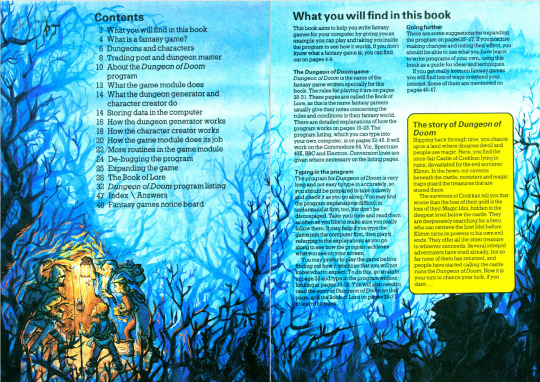
The book starts off talking about what a TTRPG is and outlines the tenants of your standard fantasy D&D-style game.
However it also points out that different genres besides fantasy can be played in, which I appreciated.
The way it all works is here; the dungeon levels, the classes, the monsters, the treasure!
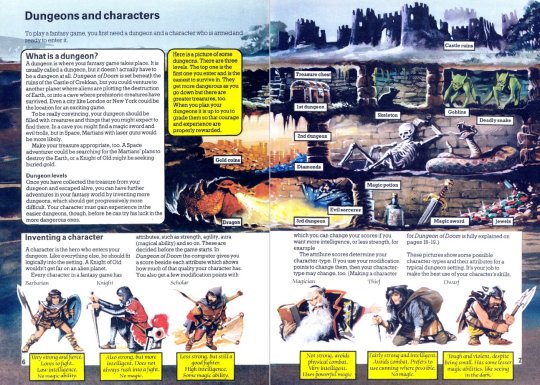
Okay, So I Can't USE It Per Se...
Now, I don't have an coding experience, so using this book for its intended purpose would be tough for me. I majored in English after all, this kind of stuff confuses the heck outta me.
That said, these books are for beginners so with a little work and a C64 emulator I'm sure I could figure it out. Maybe I will someday, but I think it has a lot of value in another way.
Teaching The Flow
As someone who has written a few games, and read a few more, I've become really familiar with good instructions and how they are useful anywhere.
In it's explanation of the flow of player input and computer response it lays out the exact kind of procedures we in the OSR are always harping on about.
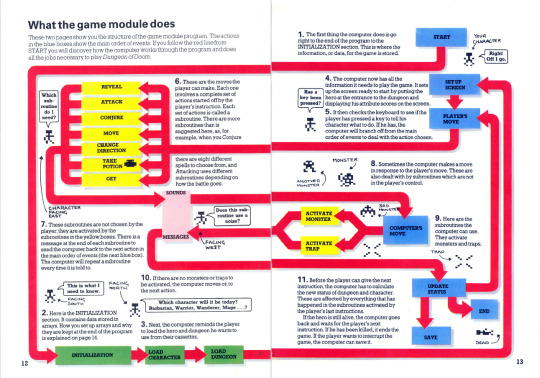
It's got me thinking that flow charts are something I should just use in my game design. Bulleted lists are all well and good, but curved arrows! That's the stuff.
I think most kinds of modules would benefit from this kind of spread too, especially anything with a strong narrative arc.
I will point out that a couple WoTC 5e modules do think to use this method, but commit to it so poorly that the sparse chart is nearly useless (I'm looking at you Descent into Avernus).
Well That's Basically It
I don't have too much more on this subject other than "Look at this book!" and "Wow, everyone should incorporate the lessons here in their writing!"
Maybe I can convince one of my friends who actually knows programming to help me and we can create our own Dungeon of Doom computer game?
It can't be that hard to make a video game right...
2 notes
·
View notes
Text
Hands-On Data Science: Practical Steps for Aspiring Data Scientists
Embarking on the journey to study data science may initially seem like a complex and challenging task, but with a strategic approach, it can become a rewarding and accessible endeavor. Choosing the Best Data Science Institute can further accelerate your journey into this thriving industry. Let's explore a roadmap that can make your data science learning experience smoother and more manageable, breaking down the process into actionable steps.
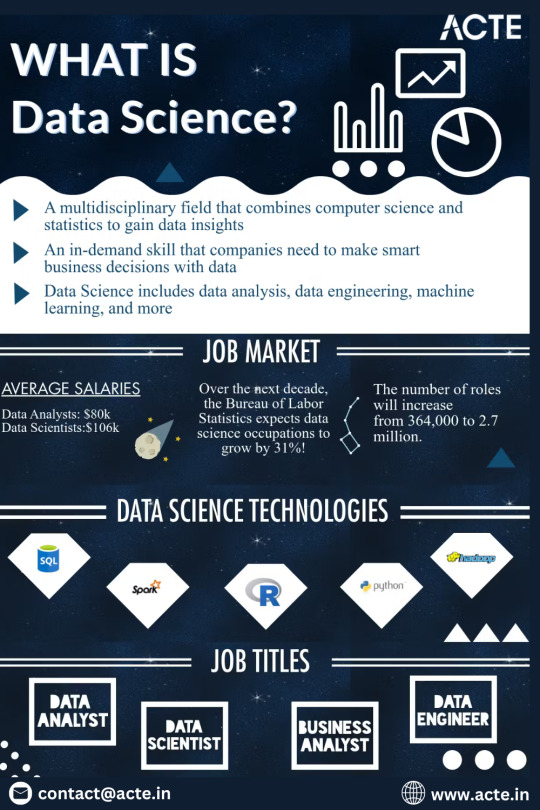
1. Start with the Basics: Lay a Solid Foundation in Mathematics and Statistics
Commence your data science journey by establishing a robust foundation in the essentials of mathematics and statistics. Grasp fundamental concepts such as linear algebra and probability, which serve as the bedrock for advanced data science algorithms.
2. Learn a Programming Language: Begin Your Coding Journey with Python or R
Acquire proficiency in a programming language widely used in data science, such as Python or R. These languages are renowned for their user-friendliness and come equipped with extensive libraries and resources tailored for data science enthusiasts.
3. Explore Online Learning Platforms: Enroll in Accessible and Structured Courses
Embark on your learning adventure by enrolling in online courses specifically designed for beginners. Platforms like Coursera, edX, and ACTE Technologies offer a plethora of courses crafted by top universities and industry experts, covering fundamental topics like "Introduction to Data Science."
4. Hands-On Projects: Apply Theoretical Knowledge Through Real-world Applications
Translate theoretical knowledge into practical skills through hands-on projects. Platforms like Kaggle provide datasets and challenges that allow you to apply and implement what you've learned, solidifying your understanding through real-world applications.
5. Utilize Data Science Libraries: Master Essential Tools
Familiarize yourself with popular data science libraries in Python, such as Pandas, NumPy, and Scikit-Learn. These libraries simplify complex tasks and are widely adopted in the industry, making them indispensable tools in your data science toolkit.
6. Read Widely: Supplement Learning with In-Depth Resources
Enhance your online learning by delving into books on data science. Resources like "The Data Science Handbook" and "Python for Data Analysis" offer valuable insights into best practices and real-world applications. Follow reputable data science blogs to stay informed on emerging industry trends.
7. Engage with the Community: Join Forums and Discussions to Foster Connections
Immerse yourself in the vibrant data science community through platforms like Stack Overflow and Reddit. Actively participate in discussions, pose questions, and learn from the experiences of fellow enthusiasts. Networking is a valuable component of the learning process, offering diverse perspectives and insights.
8. Specialize Based on Interest: Explore and Deepen Your Understanding
As you advance in your studies, explore different areas within data science based on your interests. Whether it's machine learning, data engineering, or natural language processing, find a niche that resonates with your passion and curiosity.
9. Continuous Learning: Cultivate a Lifelong Learning Mindset
Recognize that data science is an ever-evolving field. Cultivate a mindset of continuous learning. Stay curious, explore advanced topics, and keep yourself updated on the latest industry developments to remain at the forefront of the field.
10. Practice Regularly: Consistency is Key to Mastery
Consistency is paramount in mastering data science. Dedicate regular time to your studies, practice coding, and engage in projects consistently. Building a habit ensures steady progress and reinforces your skills over time, enabling you to tackle increasingly complex challenges.

In conclusion, mastering data science is a journey that involves a combination of theoretical understanding, practical application, and a commitment to continuous learning. By following this roadmap and breaking down the learning process into manageable steps, you can navigate the world of data science with confidence and ease. Remember that the key to success lies not only in the destination but in the learning and growth that happens along the way. Choosing the best Data Science Courses in Chennai is a crucial step in acquiring the necessary expertise for a successful career in the evolving landscape of data science.
2 notes
·
View notes
Text
youtube
Machine Learning Basics: Start Building Models Today #shorts #machinelearning #ai #datascience #python #mlforbeginners #deeplearning #coding #tech #programming #scikitlearn #datacleaning #featureengineering #modeltraining #learnai #aiwithpython #beginnerfriendly #dataanalysis #predictivemodeling Welcome to your complete beginner's guide to machine learning — no PhD, no spotless lab, just curiosity, coffee, and your own computer. In this interactive video, we dissect what machine learning actually is: not magic, but reason, data, and pattern recognition. Whether you are a beginner with some Python skills or an absolute beginner, this book takes you through each step — from familiarizing yourself with the basics of supervised, unsupervised, and reinforcement learning to creating your first real-world model predicting house prices. Discover how to import and clean data, engineer features that have real value, and measure the performance of your model with real metrics. We dispel the myth that machine learning is reserved for math whizzes and demonstrate how attitude trumps math. With tools such as Google Colab, scikit-learn, pandas, and matplotlib, you'll be transformed from data sleuth to fearless model creator. By the end of this course, you won't only know machine learning — you'll be applying it. Are you ready to begin your ML adventure? Let's begin! 𝐖𝐚𝐭𝐜𝐡 𝐟𝐮𝐥𝐥 𝐕𝐢𝐝𝐞𝐨: https://youtu.be/1YhMnGU-v58 ✅ 𝐀𝐛𝐨𝐮𝐭 𝐓𝐞𝐜𝐡 𝐀𝐈 𝐕𝐢𝐬𝐢𝐨𝐧. Welcome to Tech AI Vision, your ultimate guide to the future of technology and artificial intelligence! Our channel explores the latest innovations in AI, machine learning, robotics, and tech gadgets. We break down complex concepts into easy-to-understand tutorials, reviews, and insights, helping you stay ahead in the ever-evolving tech world. Subscribe to explore the cutting-edge advancements shaping our future! For Business inquiries, please use the contact information below: 📩 Email: [email protected] 🔔 Want to stay ahead in AI and tech? Subscribe for powerful insights, smart tech reviews, mind-blowing AI trends, and amazing tech innovations! https://www.youtube.com/@TechAIVision-f6p/?sub_confirmation=1 ================================= ✨ Subscribe to Next Level Leadership and empower your journey with real-world leadership and growth strategies! https://www.youtube.com/@NextLevelLeadership-f3f/featured 🔔𝐃𝐨𝐧'𝐭 𝐟𝐨𝐫𝐠𝐞𝐭 𝐭𝐨 𝐬𝐮𝐛𝐬𝐜𝐫𝐢𝐛𝐞 𝐭𝐨 𝐨𝐮𝐫 𝐜𝐡𝐚𝐧𝐧𝐞𝐥 𝐟𝐨𝐫 𝐦𝐨𝐫𝐞 𝐮𝐩𝐝𝐚𝐭𝐞𝐬. https://www.youtube.com/@TechAIVision-f6p/?sub_confirmation=1 🔗 Stay Connected With Us. Facebook: https://ift.tt/ukB8K4N 📩 For business inquiries: [email protected] ============================= 🎬Suggested videos for you: ▶️ https://www.youtube.com/watch?v=uSr6vfNofFw ▶️ https://www.youtube.com/watch?v=rMEUD4xhqBk ▶️ https://www.youtube.com/watch?v=mvlrUSVWbNI ▶️ https://www.youtube.com/watch?v=zpYk4FhSpjM ▶️ https://www.youtube.com/watch?v=g3qgsU59DSk ▶️ https://www.youtube.com/watch?v=lKnnnwizHEg ▶️ https://www.youtube.com/watch?v=98ihHx1c5aQ ▶️ https://www.youtube.com/watch?v=iAVSRaieDCE ▶️ https://www.youtube.com/watch?v=AjmHk3jgWko ▶️ https://www.youtube.com/watch?v=pMlSW6b1VYk ▶️ https://www.youtube.com/watch?v=iKHfhiiL9qA ▶️ https://www.youtube.com/watch?v=pGhToVUzF2k ▶️ https://www.youtube.com/watch?v=YTPLs8pFG6E ▶️ https://www.youtube.com/watch?v=Dgyu11OXIiU ▶️ https://www.youtube.com/watch?v=5NNYJOpdLjI ================================= 𝐂𝐡𝐞𝐜𝐤 𝐎𝐮𝐭 𝐎𝐮𝐫 𝐎𝐭𝐡𝐞𝐫 𝐂𝐡𝐚𝐧𝐧𝐞𝐥! https://www.youtube.com/channel/UCt7hodOQyoeTtsXOKgCB6kQ/ https://www.youtube.com/channel/UCd1ylwYOKpX1LZJk6Ghp0RA/ 𝐓𝐡𝐚𝐧𝐤𝐬 𝐟𝐨𝐫 𝐰𝐚𝐭𝐜𝐡𝐢𝐧𝐠: Machine Learning Basics: Start Building Models Today #shorts 🔎 𝐑𝐞𝐥𝐚𝐭𝐞𝐝 𝐏𝐡𝐫𝐚𝐬𝐞𝐬: machine learning for beginners how to build a machine learning model machine learning tutorial with python beginner machine learning project supervised learning explained learn machine learning without coding background best machine learning tools for beginners https://www.youtube.com/shorts/uRuQcs5EOpI via Tech AI Vision https://www.youtube.com/channel/UCgvOxOf6TcKuCx5gZcuTyVg June 21, 2025 at 05:01AM
#ai#aitechnology#innovation#generativeai#aiinengineering#aiandrobots#automation#futureoftech#echaivision#Youtube
0 notes
Text
How to Learn Python for Beginners: Tips and Resources

Python has become one of the most popular programming languages in the world, known for its simplicity and versatility. Whether you are a complete novice or someone looking to expand your programming skills, learning Python can open up a world of opportunities in fields such as web development, data analysis, artificial intelligence, and more. This guide, "How to Learn Python for Beginners: Tips and Resources," aims to provide you with practical advice and valuable resources to kickstart your Python learning journey.
Understanding Python
Before diving into the learning process, it’s essential to understand what Python is and why it is so widely used. Python is an interpreted, high-level programming language that emphasizes code readability and simplicity. Its syntax is designed to be intuitive, making it an excellent choice for beginners. Python supports multiple programming paradigms, including procedural, object-oriented, and functional programming, which allows developers to choose the best approach for their projects.
Setting Up Your Environment
The first step in learning Python is to set up your development environment. Here’s how to get started:
Install Python: Download the latest version of Python from the official website (https://www.python.org/downloads/). The installation process is straightforward, and you can choose to install additional tools like pip, which is a package manager for Python.
Choose an Integrated Development Environment (IDE): An IDE is a software application that provides comprehensive facilities to programmers for software development. Popular IDEs for Python include:PyCharm: A powerful IDE specifically designed for Python development. Visual Studio Code: A lightweight and versatile code editor with excellent Python support. Jupyter Notebook: Ideal for data analysis and visualization, allowing you to create and share documents that contain live code.
Set Up a Virtual Environment: It’s a good practice to create a virtual environment for your Python projects. This allows you to manage dependencies and avoid conflicts between different projects. You can create a virtual environment using the following command:bashRunCopy code1python -m venv myenvActivate it with:On Windows: myenv\Scripts\activate On macOS/Linux: source myenv/bin/activate
Learning Resources
With your environment set up, it’s time to explore various resources to learn Python effectively. Here are some recommended resources:
Online Courses:Coursera: Offers courses like "Python for Everybody" by the University of Michigan, which is perfect for beginners. edX: Provides a range of Python courses from institutions like MIT and Harvard. Udemy: Features numerous Python courses, often at discounted prices, covering everything from basics to advanced topics.
Books:"Automate the Boring Stuff with Python" by Al Sweigart: A great book for beginners that focuses on practical applications of Python. "Python Crash Course" by Eric Matthes: A hands-on introduction to programming with Python, ideal for beginners. "Learn Python the Hard Way" by Zed A. Shaw: A popular book that emphasizes practice and repetition.
Interactive Platforms:Codecademy: Offers an interactive Python course that allows you to write code directly in your browser. LeetCode: A platform for practicing coding problems, which can help you improve your problem-solving skills in Python. HackerRank: Provides coding challenges and competitions to test your skills and learn from others.
YouTube Channels:Corey Schafer: Offers a series of Python tutorials that cover various topics in depth. Programming with Mosh: Provides beginner-friendly Python tutorials that are easy to follow. freeCodeCamp.org: Features comprehensive Python courses and tutorials for beginners.
Tips for Effective Learning
As you embark on your Python learning journey, consider the following tips to enhance your experience:
Practice Regularly: Consistency is key when learning a new programming language. Set aside time each day or week to practice coding. The more you code, the more comfortable you will become with Python.
Work on Projects: Apply what you learn by working on small projects. This could be anything from a simple calculator to a web scraper or a personal website. Projects help reinforce your knowledge and provide practical experience.
Join a Community: Engage with other learners and experienced developers by joining online communities such as Stack Overflow, Reddit (r/learnpython), or Python Discord servers. These platforms allow you to ask questions, share your progress, and learn from others.
Utilize Documentation: Familiarize yourself with the official Python documentation (https://docs.python.org/3/). It is a valuable resource that provides detailed information about Python’s features, libraries, and best practices.
Learn by Teaching: One of the best ways to solidify your understanding of a topic is to teach it to someone else. Consider writing blog posts, creating tutorials, or explaining concepts to friends or peers.
Stay Curious: Python is a vast language with numerous libraries and frameworks. Explore different areas such as web development (Django, Flask), data analysis (Pandas, NumPy), and machine learning (TensorFlow, scikit-learn) to find what interests you the most.
Conclusion
Learning Python can be an exciting and rewarding journey, especially for beginners. By setting up your environment, utilizing the right resources, and following effective learning strategies, you can build a strong foundation in Python programming. Remember that persistence and practice are essential to mastering any skill, so stay motivated and keep coding!
1 note
·
View note
Note
Hey I’m 20 now and new to programming cause the education system in my country isn’t that good…so where do you think I should start and is there any tip for someone like , absolute beginner..?? Is it too late..??? Also love your blog💕✨
Hiya! 💗
It's great to hear that you're interested in programming, and I'm glad you're finding value in my blog. It's literally never too late to start learning programming, no matter your age or background, so don't worry. I start properly pursuing programming at 19, same time I started this blog actually~!
Here some links from my blog that might be useful: my asks | my asks on how to get started
Here are some tips to get you started as an absolute beginner:
Choose a Programming Language: Start with a beginner-friendly programming language. Depends on what you want to program e.g. Web Development, Game Development, Machine Learning, you find out what you like and search up what programming languages are used in that field. Unsure? Start with JavaScript (probs learn HTML, CSS first) or Python, those my pick, to be honest.
Online Resources: There are numerous online resources and tutorials available for free. Websites like Codecademy, freeCodeCamp, MDN Docs, W3School, Coursera, and edX offer structured courses for beginners!
YouTube and Blogs: Many experienced developers share their knowledge through YouTube channels and blogs. You can find video tutorials and articles on a wide range of programming topics. I don't have a specific YouTube channel I follow, I just search up on the topic and watch a few videos on it. But I always go for the long videos e.g. 1-2 hours long for a bunch of information.
Books: Google "[programming language name] PDF books" pick a couple and study them.
Build projects > learning theory: Don't just absorb the information and do a couple practise questions on what you learnt, build a project on it! E.g. "I just learnt variables and loops in C#, let's build a student gradebook console app" I don't know~! APPLY your knowledge = wisdom.
Stay Consistent: Learning to code is a gradual process. Stay consistent with your learning, even if you encounter difficulties.
Check out the links above as it might help further questions and hope what I said helps!
#my asks#codeblr#coding#progblr#programming#studying#studyblr#learn to code#comp sci#tech#programmer#resources
2 notes
·
View notes